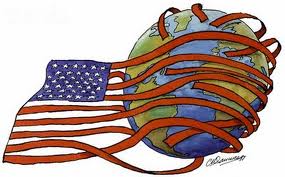On March 22nd, I headlined “Why the Western Alliance Is Ending,” and I listed the recent events which indicate that the Western Alliance doesn’t have much longer to go. And, now, it has actually already ended. The handwriting is on the wall, for everyone to see; it’s so out-in-the-open, as of today.
Here is what has just happened (as reported in German Economic News, and translated by me), which virtually brings down the curtains on America’s dominance of the world — a dominance that started when World War II ended in 1945:
March 21: “GEOPOLITICS: Washington nervous: China, Japan and South Korea forge an Alliance.” This news story reports:
“For the first time in three years, the foreign ministers of the three countries met. They agreed on Saturday in Seoul to work towards a summit of their leaders, and to take on problems with the interpretation of history [which have separated them till now]. They also expressed their intention to continue to work for a free trade agreement and for new multi-party talks on North Korea’s controversial nuclear program.”
Here’s the important context of that: The U.S. in WW II conquered Japan, which had invaded China and conquered Korea; but, now, Japan, China and South Korea are moving toward one-another, while China, and indirectly the BRICS group of rising economic powers as a whole — Brazil, Russia, India, China and South Africa — are making their move past the previous U.S.-European control of the world. Furthermore, these Asian powers are collectively inviting North Korea to move toward them, and to join this group, which would finally bring an end to the stalemated hostilities between South and North Korea. So: welcome to the 21st Century! (For more details on that, see the terrific news reporting in GEN.)
And, in addition: for these three economic powerhouses to “work for a free trade agreement” that’s outside the orbit of Obama’s secret negotiations for his TPP or Trans-Pacific Partnership with them, may mean that they all will be less likely to accept the trade-deal that he is trying to negotiate collectively with them. So: this three-party ministerial meeting is, in itself, potentially an extremely important historical event. But it is part of this larger and interconnected whole, which is far more important than any trade-deal.

